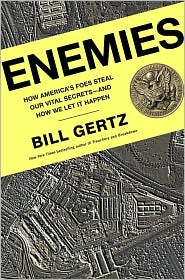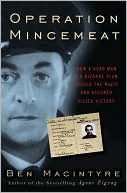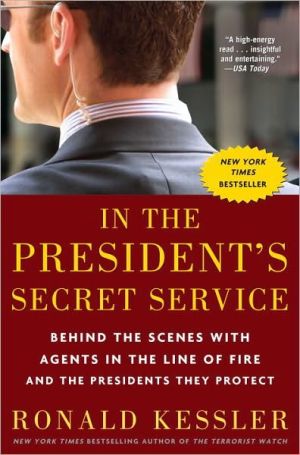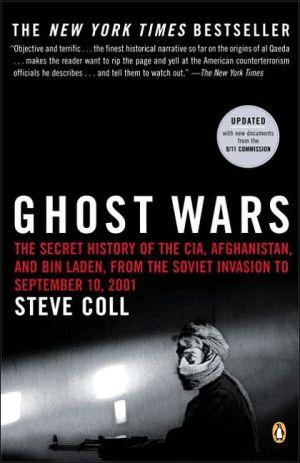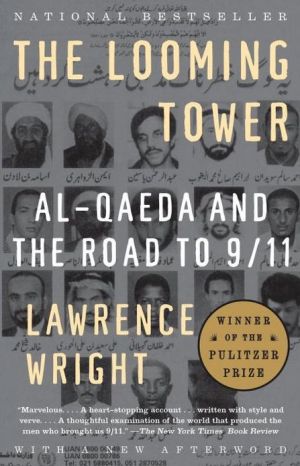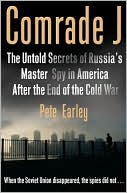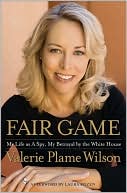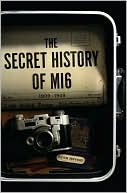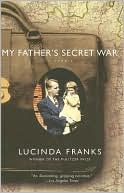Enemies: How America's Foes Steal Our Vital Secrets--and How We Let It Happen
It’s the great untold story of the war on terror.\ Taking advantage of gaping holes in America’s defenses, terrorist organizations and enemy nations like Communist China, North Korea, Russia, and Cuba—not to mention some so-called friends—are infiltrating the U.S. government to steal our most vital secrets and use them against us. And most astonishing of all, our leaders are letting it happen.\ In the explosive new book Enemies, acclaimed investigative reporter Bill Gertz uncovers the truth...
Search in google:
It’s the great untold story of the war on terror.Taking advantage of gaping holes in America’s defenses, terrorist organizations and enemy nations like Communist China, North Korea, Russia, and Cuba—not to mention some so-called friends—are infiltrating the U.S. government to steal our most vital secrets and use them against us. And most astonishing of all, our leaders are letting it happen. In the explosive new book Enemies, acclaimed investigative reporter Bill Gertz uncovers the truth about this grave threat to our national security and America’s harrowing failures to address the danger. Gertz’s unrivaled access to the U.S. intelligence and defense communities allows him to tell the whole shocking story, based on previously unpublished classified documents and dozens of exclusive interviews with senior government and intelligence officials. He takes us deep inside the dark world of intelligence and counterintelligence—a world filled with lies and betrayal, spies sleeping with enemy spies, and moles burrowing within the FBI, the CIA, the Pentagon, and even the White House.Enemies stunningly reveals:• The untold story of one of the most damaging enemy spy penetrations in U.S. history—and how the FBI bungled the investigation• How Communist China’s intelligence and influence operations may have reached the highest levels of the U.S. government• Why Russia has as many spies in America today as it did at the height of the Cold War• How al-Qaeda and other terrorist groups use official identification, uniforms, and vehicles to infiltrate secure areas and carry out attacks • How some thirty-five terrorist groups are targeting the United States through espionage• A startling account of the many enemy spies the U.S. has let get away• How a Cuban mole operated high up in the Pentagon for sixteen years• The gross ineptness that led U.S. officials to hound an innocent man while the real mole operated right under their noses• Why aggressive counterintelligence represents the only real defense against terrorists and enemy spies—and why the U.S. intelligence bureaucracy resists itDelivering the kind of shocking new information that led Washington Monthly magazine to declare him “legendary among national security reporters,” Bill Gertz opens our eyes as never before to deadly threats and counterintelligence failures that place every American at risk.America’s enemies, including terrorist organizations, are stealing our most vital secrets to use against us—and the U.S. government makes it shockingly easy for them to do so. Filled with headline-making revelations from acclaimed reporter Bill Gertz, Enemies reveals the frightening untold story of the War on Terror.Also available as an eBook
Enemies\ How America's Foes Steal Our Vital Secrets--and How We Let It Happen \ \ By Bill Gertz \ Crown Forum\ Copyright © 2006 Bill Gertz\ All right reserved.\ ISBN: 0307338053 \ \ \ Chapter 1\ \ PARLOR MAID\ \ She's been a Communist since the day she was born. Her bona fides are impeccable. I gradually converted her--she's now a rock-ribbed Republican.\ \ --FBI agent James J. Smith, introducing Chinese triple agent Katrina Leung to FBI China hands in 1993\ \ On July 5, 2000, a brand-new, $120 million Boeing 767 jetliner flew from the Boeing corporation's airfield in Everett, Washington, to San Antonio International Airport. The Chinese military had purchased the jetliner for the leader of Communist China, Jiang Zemin. China Aviation Supplies Import and Export Corporation, which is run by the Chinese Communist state, purchased the aircraft for China United Airlines, which has been identified in declassified U.S. intelligence reports as a commercial entity operated by the People's Liberation Army. Once in San Antonio, the aircraft underwent a $15 million customization to outfit the plane with all the luxuries of a Middle Eastern sheik, including a special vibrating bed to help Jiang sleep.\ \ On August 10, 2000, the modification work complete, the Boeing took off for Beijing's military airfield. Within weeks, Chinese security officials had found some twenty-seven sophisticated electronic eavesdropping devices in the aircraft.\ \ How had the bugs gotten there, when the entire customization had been under the strictest,twenty-four-hour supervision by some twenty-five Chinese military intelligence officials? It turned out that clandestine operatives from the CIA and the National Security Agency (NSA) had covertly placed the devices in the plane in hopes of gathering intelligence from Jiang prior to a future summit meeting. (To this day, the details of the bugging remain secret.)\ \ For the United States, there was a more pressing question: How had the Chinese uncovered the bugs so quickly? U.S. counterintelligence launched an investigation to find out. That probe led ultimately to the Los Angeles-based FBI counterspy James J. "J. J." Smith and his prized agent, Los Angeles businesswoman Katrina Leung--code name "Parlor Maid." A former FBI official, William Cleveland, would come under scrutiny as well.\ \ The investigation turned up a revelation that would prove highly embarrassing to the FBI: Both of these officials, two of the Bureau's most senior counterintelligence officers, had had illicit, long-term sexual relationships with Leung. Contrary to the bed-hopping image of spies popularized in James Bond films, having intimate relations with a paid FBI informant violates one of the cardinal principles of the spy business, not to mention Bureau rules.\ \ But to focus only on the soap opera element of the Katrina Leung story is to characterize the episode as something only vaguely resembling a spy case. And a spy case it is, without a doubt--a terribly damaging one at that.\ \ The real story of Parlor Maid has never been told. The main reason the full account has not emerged is that the FBI and federal prosecutors mishandled the investigation from the beginning.\ \ A small group of FBI officials did their best to keep the inside story from coming out. Rather than rage against the flagrant counterintelligence failures demonstrated in the Leung case, these officials focused on protecting the FBI's already-battered reputation from further damage. Later, prosecutors made poor tactical decisions that undermined the court case against Leung almost before it could begin.\ \ Ultimately, prosecutors had to settle for a plea deal with Leung. The deal, reached on December 16, 2005, spared Leung from serving jail time or having to admit anything about passing illegally copied classified information to Communist China.\ \ After the plea deal was finalized, Leung's lawyers--having safely escaped a trial that would have aired the overwhelming evidence of Leung's espionage--issued a statement professing that their client wasn't a spy and suggesting that she would have been glad to tell her story in court. A spokesman for the U.S. Attorney's Office in Los Angeles, Thom Mrozek, responded, "It's fair to say the government, by virtue of how this case moved along, was never able to tell its side of the story either."\ \ Mrozek's statement was accurate, but it only obliquely hinted at the reasons the case "moved along" as it did and at the powerful evidence that Katrina Leung was indeed a spy for Communist China.\ \ The real story of Parlor Maid will be told here for the first time. The Leung affair, like many cases from the dark world of intelligence and counterintelligence, is rife with lies and betrayals, half-truths and truths, myth and reality converging and diverging. But this account, based on court papers and on interviews with numerous intelligence and law-enforcement officials who knew the case firsthand, reveals the inside story of what really happened with Katrina Leung, Communist China, and the FBI.\ \ Parlor Maid is the story of a Chinese spy who got away. And not just any spy. U.S intelligence officials close to the case insist that regardless of the outcome of the prosecution, the Katrina Leung case represents one of the worst spy cases in American history--and one of the worst U.S intelligence failures, as well. The evidence buried as a result of the FBI's mismanagement and the prosecution's failures bears this conclusion out.\ \ Further confirmation came in May 2006, when Department of Justice Inspector General Glenn A. Fine issued his report on the Leung case. Fine's highly critical report identified scores of FBI failures. The first among them was the fact that the FBI ignored intelligence from an informant who said a senior FBI agent was being "run" by Chinese intelligence in Los Angeles. The spy running the agent was Katrina Leung, and the agent was J. J. Smith. "The FBI's failure to fully investigate Leung early on," the report stated, "was a lost opportunity to obtain information concerning the PRC's attempts to acquire technology and her contacts with persons of investigative interest to the FBI." The inspector general also made it clear that Leung was in fact a spy for China, not the FBI. The report stated clearly that Leung "provided classified U.S. government information to the PRC without FBI authorization." It revealed that at every step of the way in Leung's career as an FBI informant, for which she was paid $1.7 million, there were glaring signs that she was not who she claimed to be.\ \ The extensive record makes it clear that the People's Republic of China--an emerging world power that poses a direct threat to the United States--penetrated the FBI. For more than two decades Communist China ran a spy, Katrina Leung, who stole valuable secrets from the U.S. government and intelligence community. More than that, this penetration agent, who had more than 2,100 contacts with Chinese officials over the course of twenty years, helped the Beijing regime exert enormous influence in the United States.\ \ As revealed by the inspector general's report, by many declassified intelligence reports, by FBI documents, and by other documents submitted in court, Leung compromised all the FBI's foreign counterintelligence investigations on China. The FBI already struggled at aggressive counterintelligence, the vital technique that represents the best way to discover our adversaries' true intentions and, if necessary, to thwart dangerous plans before they are executed. The Chinese agent did incalculable harm by ruining the few successful counterintelligence operations that the United States had in place.\ \ Adding to the damage, Leung's frequent reports on China apparently contained strategic disinformation about Beijing's plans and intentions. For many years these reports, intelligence officials told me, reached the highest levels of the U.S. government--including the Oval Office. The Chinese government could tailor its deceptive information to conform with U.S. beliefs and expectations because it had access to the deepest secrets from within the U.S. government and intelligence community. One legal document in the court case quotes U.S. government officials as stating that given the magnitude of the compromises, the FBI "must now re-assess all of its actions and intelligence analyses based on [Leung's] reporting."\ \ Parlor Maid is a textbook case of how Communist China uses its intelligence services and agents not simply to gather intelligence but also to run aggressive counterintelligence operations, to manage its adversaries' perceptions of the emerging Chinese superpower, and to conduct disinformation operations against the United States. The Katrina Leung case provides a harrowing reminder that Communist China has made the United States its number-one target. But largely because of the effectiveness of China's penetration and disinformation campaigns, we have reached the point where top U.S. government officials dismiss a nuclear-armed Communist dictatorship in Beijing as "not a threat" to the United States.\ \ And at the end of the day, Parlor Maid is a story of criminal negligence and cover-up on the part of the FBI. The truth must be revealed.\ \ The Intercept\ \ On November 26, 1990, a decade before China discovered the electronic bugs on Jiang Zemin's Boeing 767, the telephone rang at the Chinese Ministry of State Security (MSS) in Beijing. MSS is the Chinese Communist equivalent of the FBI and CIA combined, with the political police aspects of Moscow's KGB added. The caller, a woman, spoke Mandarin and identified herself as Luo Zhongshan. She asked to speak to Mao Guohua, the head of the MSS Foreign Affairs Bureau, one of the units that runs China's intelligence-gathering operations in the United States. The conversation was intercepted and recorded by the NSA, the supersecret electronic spying and code-breaking agency.\ \ mao:Who's this?\ \ luo:Uh, greetings. Hey.\ \ mao:I recognize you now.\ \ luo:-There are two situations right now. I don't want to disclose it over the telephone.\ \ mao:Uh.\ \ luo:The matter which I told you I was going to do.\ \ mao:Uh.\ \ luo:[It's] too late.\ \ mao:Oh.\ \ luo:He/she has arrived already.\ \ Luo asked whether Wang Jingqiang, one of the MSS's couriers, had returned to China from the United States and given Mao something on his return. Mao replied that Wang had not returned yet. Luo told the intelligence official to call Wang, since one person had already arrived and was staying at the Traders Hotel in Beijing for a week. The person referred to was a visiting FBI official.\ \ Within days, the intercept was translated and a copy provided to the FBI's San Francisco field office. It landed on the desk of Bill Cleveland, a supervisory special agent who ran counterintelligence for the FBI on the West Coast. Cleveland had spent more than two decades chasing Chinese spies and was widely considered the Bureau's premier Chinese counterspy.\ \ When Cleveland saw the transcript, he recognized what the MSS was being told: that Cleveland himself and another FBI agent, I. C. Smith, were going to be in China and staying at the Traders Hotel. Cleveland immediately went to a secure room to listen to a recording of the intercepted phone call. He quickly identified the voice as that of Parlor Maid, the code name for Katrina Leung.\ \ "That's her," he said.\ \ The intercept was a shock. Leung was the Bureau's prize agent, one of the few people who, the FBI believed, had access to the inner circle of the Chinese Communist leadership and could get inside the secretive world of the Chinese intelligence bureaucracy. Her reports on China went to the CIA and the National Security Council in Washington, and even on to the president. But the Luo-Mao intercept revealed why counterintelligence has been called a wilderness of mirrors, where agents can trade loyalties as easily as they change clothes. The fact that Leung had a clandestine name for contacts with Chinese intelligence meant only one thing: She was working for the Chinese while pretending to be a paid FBI informant.\ \ The intercept was an intelligence officer's worst nightmare, because it revealed that Leung was using a code name that was unknown to the FBI for what she believed was a clandestine conversation with her MSS handler.\ \ Cleveland would have known immediately that the intercept meant trouble. The reason was simple: Since the late 1980s he had been conducting a secret extramarital affair with Leung. He would meet Leung, a Chinese-born naturalized American, in hotels in Los Angeles and San Francisco, debrief her about his visits to China, and then have sex with her. As Cleveland well knew, such illicit relations with a paid informant were taboo in the FBI.\ \ There was another wrinkle: Cleveland wasn't the only FBI agent sleeping with Leung. According to counterintelligence officials, Cleveland suspected--accurately, as it turned out--that Leung was also carrying on an illicit affair with her immediate handler, James J. Smith, the agent who had recruited her in the early 1980s. As soon as FBI headquarters launched an investigation into the intercept, Cleveland's and Smith's secrets would be revealed.\ \ The Confrontation\ \ The intercept of one of the Luo-Mao phone calls prompted a meeting at FBI headquarters in Washington. On May 14, 1991, FBI officials gathered to discuss Leung's evident lying and betrayal. The fact that she had met with Mao in Beijing a month after the initial intercept raised further questions. But indicative of the hands-off approach FBI headquarters took to field operations, the officials agreed to let James J. Smith, her handler, deal with the situation. The FBI thus missed a key chance: either to end its relationship with Leung altogether, or to use the information to try to "turn" her back as a spy for the United States against China--the ultimate counterintelligence challenge. As the inspector general's report put it, had the Bureau followed up properly at the time, it might have discovered the "fundamental flaws" in Smith's handling of Leung "10 years before the FBI actually began such an investigation." But, "incredibly," the FBI didn't think to ask "how it was that Leung had obtained the information she supplied to the PRC" in the first place. As Smith later admitted, the information all came from him.\ \ Whatever doubts officials may have had about Leung, neither Cleveland nor Smith--known as J. J.--shut down Leung's penetration operation. Instead, J. J., Leung's handler and secret lover, confronted Katrina about the intercept.\ \ The confrontation took place on May 31, 1991, which Leung later called the "worst day of my life." J. J. showed up alone at Leung's home in San Marino, California. Angry about the intercepts, he began questioning her about her conversations with Mao. Sitting at the kitchen table, Smith told her that the conversation they were having was the most important one they would ever have. The FBI knew she had a cover name, he told her, and that she was passing information to Chinese intelligence without FBI approval. He said specifically that the Bureau was aware she had notified the MSS of Cleveland's travel to China and his plans to stay at the Traders Hotel. In an earlier conversation she had told J. J. she did not know how Mao knew Cleveland had gone to China. Now J. J. called her on it. "I know what you have been doing and you have not been truthful," he told her.\ \ "J. J., whatever you do, don't yell at me," she said. "We can have this conversation, just don't yell at me."\ \ She then admitted to giving information to Chinese intelligence. Katrina Leung, it turned out, was what counterspies call a "triple agent"--she pretended to be a double agent controlled by and loyal to the FBI, but she had been trained by Chinese intelligence and secretly she remained loyal to Beijing. \ \ Continues... \ \ \ \ Excerpted from Enemies by Bill Gertz Copyright © 2006 by Bill Gertz. Excerpted by permission.\ All rights reserved. No part of this excerpt may be reproduced or reprinted without permission in writing from the publisher.\ Excerpts are provided by Dial-A-Book Inc. solely for the personal use of visitors to this web site. \ \
\ From Barnes & NobleIn this full-frontal follow-up to Treachery and Breakdown, Washington Times defense and national security reporter Bill Gertz issues a warning about infiltration of American government secrets by enemy nations and terrorist groups. Offering stunning documentation, he argues that our enemies and friends alike are penetrating the gaping holes in our defense. The countries mentioned in this indictment include Iran, China, Syria, Cuba, Russia, France, India, Pakistan, Japan, Taiwan and both North and South Korea. Insider scoops; muckraking that matters.\ \
